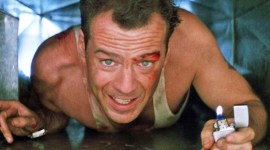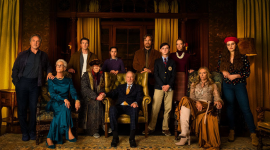
The 7 Best Golf Movies Of All Time
Golf movies are an under-explored sub-genre within sports films. Here’s everything you need to know about the cinematic art behind some of the best golf films.
Unlike many of the other sports genre films, golf films have an interesting wrinkle that you don’t find in many other competitions. Unlike football, the other (American) football, baseball, or basketball, for example, the central theme behind golf isn’t man-versus-man; it’s man-versus-himself. (You could also say man-versus-nature, but that’s perhaps being a bit too literal.)
Ultimately the sport of golf is about rising above oneself and one’s own limitations. And for filmmakers, this can sometimes be a difficult concept to bring to the screen. However, in the hands of a suitable writer and director, it’s also a core element that can make films great.
So today, in our series on the different sports film genres, let’s explore some of the best examples of the golf film to see how different filmmakers have figured out how to tell stories centered around this self-focused yet highly cinematic pastime.
Honorable Mentions
Now, of course, before we get into our top picks, we have some honorable mentions to share that are worth checking out—if at least to learn a bit more about the sport of golf, and golf in film, in general. These are mostly documentary-based projects and include Hit it Hard (an ESPN 30 for 30 film which focuses on famous anti-hero golfer John Daly), The Short Game (a great doc exploring youth golf), and The Founders (which tells the important story of the 13 female golfers who created the LPGA).
7. The Legend of Bagger Vance (2000)
While, quite sadly, considered a box office bomb on its release, The Legend of Bagger Vance has quietly become a staple of off-season GolfTV programming and has grown in esteem with fans of the sport. It’s also perhaps the best example of a proto-typical period sports drama as it follows a simple formula to hit all the hallmark notes of a feel-good sports saga.
What makes Bagger Vance work, though, are its great performances by its all-star cast, including Will Smith, Matt Damon, and Charlize Theron, as well as its subtle but sincere direction by Robert Redford—who in particular knows a thing or two about what makes a great sports film.
6. Bobby Jones: Stroke of Genius (2004)
Similar to Bagger Vance, our next top golf film example is another by-the-numbers biographical drama. Bobby Jones: Stroke of Genius tells the story of real-life golfer Bobby Jones, the only player to win all four of the men’s major golf championships in a single season (a feat perhaps harder than any distinction in any sport).
Starring Jim Caviezel, Stroke of Genius is simply a continuation of what you could call this “safe” style of approach to sports films. Focus on a famous player or story, or base it off a popular book or IP, and put together a familiar-feeling film that relies on the performance of a great lead.
While Stroke of Genius might not win any Academy Awards, these niche sports films can prove to be quite lucrative as they find a home with a loyal audience of fans who will watch, rent and/or buy these films for years to come.
5. The Caddy (1953)
Now for our next selection, we’re venturing quite further into the past. And, truth be told, outside of some non-descript fighter or boxer films of the 1920s and 30s, there aren’t too many “sports” films from the pre-modern Hollywood era.
The Caddy is a rare exception, but mainly because it only uses the sport as more of a background for the comedy antics of its star team of Martin and Lewis. The golf film overall, though, certainly proves that golf as a subject is rife with potential for comedy and parody.
The Caddy establishes many themes about the sport that will be used again in this sub-genre, notably the perceived snobbishness of the sport as a way to poke fun at the rules, rituals, and decorum.
4. The Greatest Game Ever Played (2005)
Again, quite similar to Bagger Vance and Stroke of Genius, we also have to highlight The Greatest Game Ever Played as perhaps the best textbook example of the feel-good sports drama. The sport of golf, with its older fans and players for the most part, certainly lends itself well to this format—and this film does it better than perhaps any other.
If you want to study the best example of how to tell a golf story (or any sport) straightforwardly and sincerely, this is the best example. Directed by Bill Paxton, The Greatest Game Ever Played stars Shia LaBeouf as Francis Ouimet, the first amateur to win the U.S. Open. It’s about as heartwarming as they come but shines in its story and direction.
3. Caddyshack (1980)
Learning from the early success of comedy films that used golf as a backdrop like The Caddy, Caddyshack might be the most well-known golf film of them all. It was also a significant hit on its release and went on to help launch the careers of numerous comedy icons like Chevy Chase, Rodney Dangerfield, Bill Murray, and Harold Ramis.
Similarly to The Caddy, Caddyshack takes a mostly satirical take on the sport of golf and uses it to lampoon those who take it (in the film’s opinion) too seriously. From a filmmaking perspective, it’s also a great example of low-budget, indie filmmaking as it was shot quite noticeably on-location and mostly in outdoor, brightly lit settings.
Its legacy lives on both in the annals of both comedy and sports film history as the shining example of how sports can be entertaining and funny source material.
2. Happy Gilmore (1996)
Between Caddyshack (and its poorly received sequel) in the 1980s, and the implosion of safe, feel-good golf films of the early 2000s, there was a golden moment in the 1990s where sports films became one of the most popular genres of mid-level blockbusters.
In 1996, former SNL star Adam Sandler cemented himself as a bonafide comedy A-lister with the release of Happy Gilmore, which followed the comical story of a former hockey player with anger management issues joining the PGA tour.
While not a huge critical darling at its release, Happy Gilmore became somewhat of a sensation launching Sandler’s career and comedy stylings, as well as—at least for a bit—ushering in new, younger interest in the sport of golf itself.
Happy Gilmore is also noteworthy in how it seemed to bridge the gap between strictly satirical comedy at the sport’s expense, as well as actually building up a bit of the prestige of the game itself with enough reverence that it gave the golf sub-genre and the sports genre itself a new cinematic style altogether.
1. Tin Cup (1996)
This leads us to our pick for the best golf film of all time. Released merely six months after Happy Gilmore’s fun-loving comedy-sports hybrid, Tin Cup captured a similar cross-genre style as it expertly combines elements of the romantic film (or rom-com) with the classic sports genre.
Starring Kevin Costner and Rene Russo and being co-written and directed by Ron Shelton (who also wrote the standout baseball genre film Bull Durham), Tin Cup went on from modest box office praise. It returned to be one of the most memorable and quote-worthy sports films of all time.
Kevin Costner’s hard-headed character, in particular, has become an icon for any sports genre film to homage or copy moving forward. He’s also a tremendous romantic counterpart to love interest Rene Russo’s Dr. Molly Griswold.
Overall, the film is the perfect example of how a writer, director, and starring cast can treat sports as a convenient background for another genre type altogether and a revered character in the film itself.
Feature image via Warner Bros.
For more filmmaking advice and lists, check out these additional articles.





